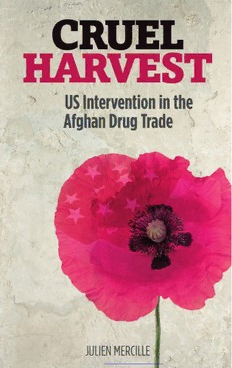
Cruel Harvest: US Intervention in the Afghan Drug Trade PDF
Preview Cruel Harvest: US Intervention in the Afghan Drug Trade
Cruel Harvest Mercille T02564 00 pre 1 05/11/2012 09:44 Mercille T02564 00 pre 2 05/11/2012 09:44 Cruel Harvest us Intervention in the afghan Drug trade Julien Mercille Mercille T02564 00 pre 3 05/11/2012 09:44 First published 2013 by Pluto Press 345 archway road, london N6 5aa www.plutobooks.com Distributed in the united states of america exclusively by Palgrave Macmillan, a division of st. Martin’s Press llC, 175 Fifth avenue, New York, NY 10010 Copyright © Julien Mercille 2013 the right of Julien Mercille to be identified as the author of this work has been asserted by him in accordance with the Copyright, Designs and Patents act 1988. British library Cataloguing in Publication Data a catalogue record for this book is available from the British library IsBN 978 0 7453 3233 8 Hardback IsBN 978 0 7453 3232 1 Paperback IsBN 978 1 8496 4776 2 PDF eBook IsBN 978 1 8496 4778 6 Kindle eBook IsBN 978 1 8496 4777 9 ePuB eBook library of Congress Cataloging in Publication Data applied for this book is printed on paper suitable for recycling and made from fully managed and sustained forest sources. logging, pulping and manufacturing processes are expected to conform to the environmental standards of the country of origin. 10 9 8 7 6 5 4 3 2 1 Designed and produced for Pluto Press by Chase Publishing services ltd typeset from disk by stanford DtP services, Northampton, england simultaneously printed digitally by CPI antony rowe, Chippenham, uK and edwards Bros in the united states of america Mercille T02564 00 pre 4 05/11/2012 09:44 Contents Abbreviations vi Acknowledgements vii 1. Introduction 1 2. Perspectives 10 3. Rise to Prominence 24 4. From Forgotten State to Rogue State 45 5. To Afghanistan 67 6. Washington and the Afghan Drug Trade since 2001 81 7. Solutions 105 8. Conclusion: American Power, Drugs, and Drug Wars 126 Notes 131 Bibliography 159 Index 177 Mercille T02564 00 pre 5 05/11/2012 09:44 abbreviations AREU Afghanistan Research and Evaluation Unit BCCI Bank of Credit and Commerce International CAT Civil Air Transport CIA Central Intelligence Agency CSTO Collective Security Treaty Organization DEA Drug Enforcement Administration EU European Union FARC Fuerzas Armadas Revolucionarias de Colombia (Revolutionary Armed Forces of Colombia) GAO Government Accountability Office (United States) GATT General Agreement on Tariffs and Trade GDP Gross Domestic Product ICOS International Council on Security and Development (formerly Senlis Council) INCB International Narcotics Control Board INL Department of State’s Bureau of International Narcotics and Law Enforcement Affairs (United States) ISAF International Security Assistance Force ISI Inter-Services Intelligence (Pakistan) KMT Kuomintang NATO North Atlantic Treaty Organization NSP Needle and syringe exchange programs NWFP North-West Frontier Province (Pakistan) RAWA Revolutionary Association of the Women of Afghanistan RDF Rapid Deployment Force SCO Shanghai Cooperation Organization TAP Turkmenistan-Afghanistan-Pakistan pipeline (Trans- Afghanistan Pipeline) UN United Nations UNAMA United Nations Assistance Mission in Afghanistan UNDCP United Nations International Drug Control Program UNODC United Nations Office on Drugs and Crime UNSCR United Nations Security Council Resolution WHO World Health Organization vi Mercille T02564 00 pre 6 05/11/2012 09:44 acknowledgements Thank you to all who agreed to be interviewed for this book or provided material and information at UNODC, the National Security Archive, the US military and government, DEA, NATO, and organizations in Afghanistan, the United States and elsewhere. Thank you also to Sonali Kolhatkar, James Ingalls, Enda Murphy and others for comments on earlier drafts, as well as to the staff at Pluto Press for editing and publishing support. vii Mercille T02564 00 pre 7 05/11/2012 09:44 Mercille T02564 00 pre 8 05/11/2012 09:44 1 Introduction THE ARGUMENT Afghanistan is the world’s uncontested leader in heroin production, accounting for as much as 90 percent of global supply, leading some commentators to label it a “narco-state.”1 Counternarcotics operations in the country have been intensified over the last few years, led by the United States with the participation of NATO allies. The stakes are high, we are told, because drugs fund the insurgency, corrupt the political process, and increase addiction around the world. The Taliban are invariably depicted as the main culprits and beneficiaries of the drug trade, along with a host of corrupt government officials. It is thus claimed that eliminating the narcotics industry would weaken the insurgency and allow the United States to preside over the establishment of a stable and democratic Afghan polity. This book’s position differs and documents the United States’ complicity in drug trafficking and repeated failure to reduce drug problems. For example, Washington has long supported or tolerated traffickers around the world, has looked the other way while the global financial system launders large sums of narcotics money every year, and has consistently adopted the counterdrug strategies known not to work. Counternarcotics missions abroad mostly target individuals and groups that are considered enemies or who have outlived their usefulness, while allies are rarely prosecuted. This, in fact, seems to have become President Obama’s official policy in Afghanistan, as when his administration specified in 2009 that it is drug traffickers with links to the insurgency that will be targeted (see chapter 6). The book suggests that so-called “drug wars” have, in effect, served to facilitate intervention overseas. A few days before the US-UK attack on Afghanistan in October 2001, the British prime minister, Tony Blair, declared that the Taliban is a regime “funded on the drugs trade. The biggest drugs hoard in the world is in Afghanistan, controlled by the Taliban. Ninety per cent of the heroin on British streets originates in Afghanistan. The arms the Taliban are buying today are paid for with the lives 1 Mercille T02564 01 text 1 05/11/2012 09:44
